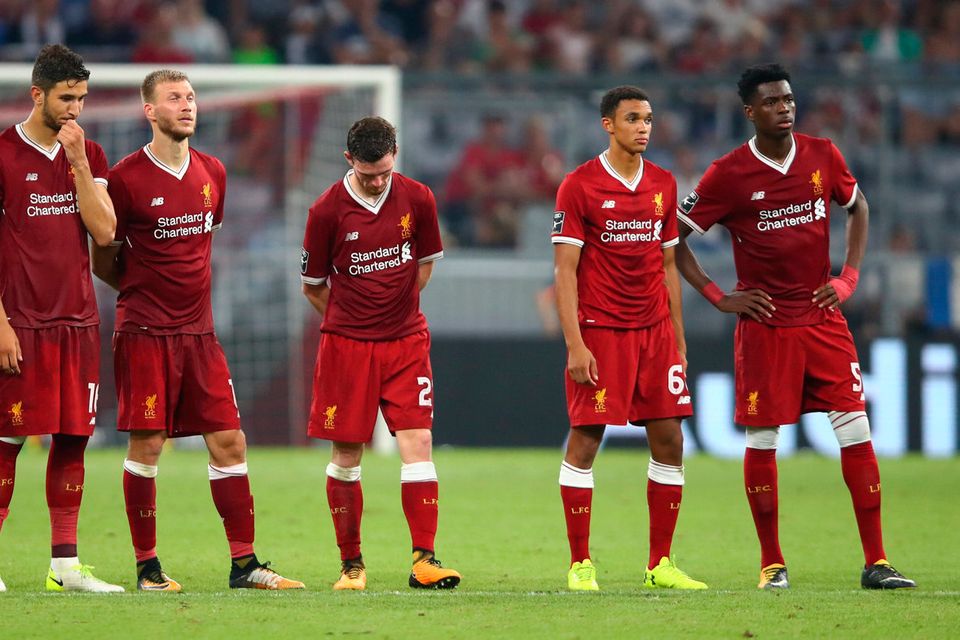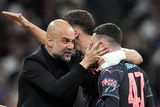Five things we learned from the Liverpool's Audi Cup final defeat against Atletico Madrid on penalties
Liverpool players look dejected during the penalty shootout. REUTERS/Michael Dalder
Liverpool suffered a penalty shoot-out defeat in the Audi Cup final against Atletico Madrid on Wednesday night, succumbing 5-4 on penalties after salvaging a 1-1 draw late on in the 90 minutes.
Keidi Bare opened the scoring for the side from La Liga just after the half-hour mark, nodding home on the rebound from close range after Danny Ward had made a tremendous save from the initial effort.
The best chance for Liverpool in the first half came from Dominic Solanke’s header which drifted wide, with both teams struggling to get numbers forward with regularity.
Aggressive challenges on either side inhabited any real fluidity in the play, with several cards being shown; Jurgen Klopp had said after the match against Bayern that he hoped Atletico would temper their fiery approach, but it certainly wasn’t the case—though his own team also responded in kind.
After the break Liverpool went close through a deflected Andrew Robertson cross and Atletico’s Angel Correa attempted a 40-yard free-kick, somewhat summing up a game which had comfortably more yellow cards than clear chances on goal.
Indeed, the biggest cheers of the night were reserved for the entrance of former Reds striker Fernando Torres, coming on as substitute late on - until Divock Origi was upended in the box inside the last 10 minutes and Roberto Firmino buried the resulting penalty.
That sent the match to a shoot-out, with Jordan Henderson missing Liverpool’s second and Atletico netting all five of theirs.
Here are five things we learned from the Reds’ shootout loss to Atletico:
1. A final isn’t really a final when it’s still pre-season
Forget whether Liverpool won or lost, the line-ups and the tempo of the first half showed exactly how both teams approached this fixture: a follow-up friendly to give game time to squad members, those returning to full fitness and a smattering of young hopefuls.
It’s arguable that the most energy and aggression in the opening 45 minutes came from the two men stood on the touchline, the profusely sweating Diego Simeone and the animated, irritated Klopp.
The second half was a little better in terms of tempo, but it could hardly be termed a memorable encounter, even for a friendly.
Endeavour and effort weren’t the issue, rather a clear intent from Atletico to stick to their own usual safety-first tactics and Liverpool being either too fatigued or too uninspired to find a way through with regularity.
2. Additional wide options still a requirement
The twin impact made by Mohamed Salah and Sadio Mane has Liverpool fans salivating at the prospect of tearing into Premier League teams next term, but what about when one is absent? Injuries, internationals and simple fatigue in a campaign when the club expects to play upwards of 50 matches will all take their toll and must be accounted for.
At this stage there’s an easy option: Philippe Coutinho or Adam Lallana move into the front three from central midfield, but they are far more schemers and inventive options rather than the dagger-thrust speed merchants that are the two African attackers. Unless Klopp is willing to keep one of his young options at the club - Ryan Kent has made the best impression over pre-season - and play them in top-flight games, there is no like-for-like alternative.
Divock Origi could be, but again he’s moving out of his preferred position and hasn’t particularly excelled, certainly not with consistency, over the last 12 months.
Versatility is something Klopp clearly values in his players, and given Mane and Salah are likely to be the guaranteed starters it would certainly be of benefit to any new additions that they could find game time in different roles. But missing out on points last season as a result of having no replacement for Mane was a critical issue for the Reds; Salah has been signed to mitigate that problem but an element of reliance still remains on that type of player.
If he wants to play regularly with two, Klopp needs three in his squad who can attack in that same fashion.
3. Can as Henderson’s alternate
With Klopp keeping only two starters in place from the win over Bayern Munich 24 hours previous, the midfield arrangement was always likely to be of interest. And with Emre Can starting deepest of the three, it’s a strong indication that the German will play a critical role this coming season: not just as a first-choice as one of the No. 8s, but also as Jordan Henderson’s backup in behind.
Gini Wijnaldum might have been an option - and indeed filled in from time to time. Likewise Marko Grujic. If Klopp had confidence the young Serb would go more than 20 minutes without making an ill-advised challenge, but it’s Can who clearly has the dual role.
That prompts two further considerations: how much game time will Henderson see this term? The skipper has played - and thus missed - precisely 50 per cent of league minutes over the past two campaigns, so his stand-in must be reliable, both in performance and availability, if Liverpool wish to challenge near the top. Secondly, Can’s own contract situation is yet to be resolved. With one year left on his deal Liverpool show no inclination to offload him, yet it will likely cost an awful lot more to replace him next term with nothing recouped than it might to agree a somewhat higher salary this year.
Can can do a fine job in either role, though it’s important to note his tendency to surge upfield - either dribbling or pressing - at a moment’s notice, which isn’t necessarily an optimal trait when playing as the holder.
4. No clear winner in a three-way fight for left-back
James Milner was Liverpool’s first-choice left-back last season, while many fans assume the signing of Robertson from Hull City will see him inch his way into the side sooner or later. Over the course of the Audi Cup, though, it was Alberto Moreno’s performance against Bayern which was the clear stand-out.
One display doesn’t win a place in the team, of course, but if every moment on the pitch is an opportunity to stake a claim, the Spaniard made his case far more emphatically than his two positional rivals.
Milner has been injured recently and Robertson is still coming to terms with training and playing in Klopp’s style, but at the very least Moreno has earned himself another chance, another consideration - assuming a move away isn’t already lined up, that is.
The assumption must be that Milner hasn’t lost his spot and, fitness permitting, will line up on that side of defence on the opening day of the Premier League season, but Klopp has had no hesitation in changing regular starters beforehand and it’s clear there’s a fight on for that particular role.
5. Ward is too good to be third-choice
Welsh international goalkeeper Danny Ward is a Premier League-standard No. 1, that is without question. He might, at this stage, be a serviceable back-up for a top side, given game time to continue his development, but he’s certainly far too good to be a third choice.
Ward has rarely put a foot (or glove) wrong when chosen as custodian under Klopp; he’s confident, commanding, unafraid in possession and has good reflexes, all of which were honed last term with regular game time and promotion success in his loan spell at Huddersfield.
Given his chance against Atletico, his minimal involvement was nonetheless impressive: a superb instinctive tip onto the crossbar which, unfortunately for him, only rebounded to Bare to score, then a great save late on just after his side had equalised.
On performances in a Liverpool shirt so far, he has been less error-strewn than Loris Karius. That’s not to say he’s better all-round, or should immediately be No. 1, but it will seem tremendously harsh - and potentially detrimental - if he’s left to watch Karius and Simon Mignolet fight it out for the majority of matches.















